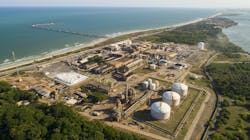Workers Resume Surveillance Activities at Braskem's Closed Salt Mine in Brazil
A Braskem spokesperson said Jan. 8 that Brazil’s civil defense department has allowed workers to resume on-site monitoring activities at a closed salt mine in the coastal city of Maceio.
“The resumption of Braskem's operations follows the Municipal Civil Defense's decision to downgrade the alert level to attention,” said Stacy Torpey, a communications director for Braskem, in a Jan. 8 email.
The Civil Defense Authority of Maceió had placed the mine and surrounding areas on a “maximum alert” level due to the imminent risk of collapse.
The mine partially collapsed on Dec. 10, the city’s civil defense authority said. During the operational alert level, the Municipal Civil Defense ordered that no one could remain in the area for safety reasons, Braskem said. During this period, authorities suspend all work on the site, and surveillance continued using technology, Torpey said.
The monitoring technologies include 550 pieces of equipment, including a cameras, drones and alarms. Property surveillance is carried out by 228 professionals hired by a specialized company that works in shifts 24 hours a day, seven days a week, patrolling the neighborhoods, Torpey explained.
On Nov. 28, Braskem’s advanced monitoring network first detected “unusual soil movement” in the area, said Stacy Torpey, a communications director for Braskem, in an email response to Chemical Processing.
Braskem stopped operations underway to close the wells and promptly informed the civil defense authorities, Torpey said.
On Dec. 21, Brazil's federal police executed 14 search and seizure warrants aimed at current and former Braskem employees linked to a salt mine facing the threat of collapse, Bloomberg News reported.
Braksem mined the salt for its chlor-alkali dichloroethane production units in the area. mine has been inactive since 2019 after a Geological Survey of Brazil report indicated a potential relationship between an earthquake event and the extraction activities carried out by Braskem.
Over the past four years, approximately 40,000 residents from the affected regions have relocated due to safety concerns and are receiving compensation from Braskem.



